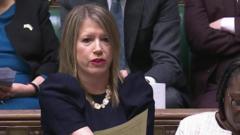MPs Raise Concerns About Assisted Dying Bill Despite Initial Support
The assisted dying bill, which passed its first stage in the House of Commons with a majority of 55 votes, is facing scrutiny from some MPs who supported its initial passage. The proposed legislation would allow adults with less than six months to live to end their life with a doctor’s assistance, subject to approval from two doctors and a High Court judge.
A key point of contention is a provision that allows medical practitioners to raise assisted dying as an option without the patient initiating the conversation. Several MPs have expressed reservations about this aspect of the bill.
Mike Tapp, a Labour MP, argued that the bill should explicitly state that medical practitioners cannot initiate discussions about assisted dying. He believes this would help prevent potential coercion during a vulnerable time. Similarly, Roz Savage, a Liberal Democrat MP, emphasized that assisted dying should be “patient-led, not doctor-led.”
The British Medical Association (BMA) has a different perspective, arguing that doctors should not be legally prohibited from discussing assisted dying if they believe it appropriate. A BMA spokesperson stated that doctors should be trusted to use their professional judgment and take cues from patients.
Marie Tidball, a Labour MP with a disability, stressed the importance of presenting all options to patients. She argued that assisted dying must be considered alongside the best possible palliative and end-of-life care to represent a genuine choice.
Conservative MP Danny Kruger warned that the bill could be defeated in later stages if MPs’ concerns are not adequately addressed. He described the legislation as “very dangerous” and suggested that many of his colleagues share similar reservations.
The bill’s initial passage was the result of a free vote, allowing MPs to vote according to their conscience. Notable supporters include Prime Minister Sir Keir Starmer and former Prime Minister Rishi Sunak, while Tory leader Kemi Badenoch voted against the bill.
A source close to Kim Leadbeater, the Labour MP introducing the bill, indicated openness to discussing and potentially amending the controversial provisions during committee discussions next year.
The bill will undergo further scrutiny and multiple rounds of voting in the coming months. It will require approval from both Houses of Parliament before becoming law. MPs who currently support the bill are seeking to refine its provisions to address concerns about patient autonomy, potential coercion, and the role of medical practitioners in discussing end-of-life options.
The debate reflects the complex ethical considerations surrounding assisted dying, balancing individual choice, medical ethics, and the protection of vulnerable patients.




